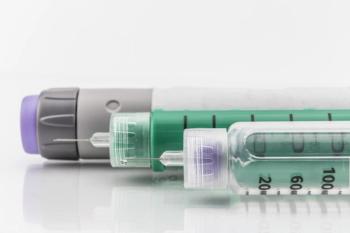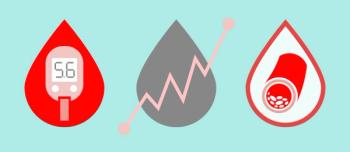
Diabetes
Latest News

Latest Videos

CME Content
More News

Different dietary approaches were able to improve the state of health in patients with type 2 diabetes (T2D), with very-low-calorie ketogenic diets demonstrating better results on gut microbiota profile.

Noninvasive methods of measuring blood glucose levels have demonstrated promise in early trials and could be potential replacements for glucose monitoring in the future, according to a review.

Producing insulin in state could help to lower the price for California residents with diabetes in the 3 years following implementation of the CalRx initiative.

Mobile health (mHealth) and a patient activation program could serve as a model for improving health outcomes for patients in outpatient clinical settings by decreasing atherosclerotic cardiovascular disease risk score.

Patients with type 2 diabetes who use empagliflozin or sodium-glucose cotransporter 2 (SGLT2) inhibitors (SGLT2) long term were shown to have less kidney function loss.

A cross-sectional study found that fibrosis-4 index was linked to arterial damage and risk of coronary heart disease (CHD) in people with type 2 diabetes (T2D).

Medicaid enrollees residing in counties with greater food affordability had lower odds of preventable hospitalization related to diabetes.

Patients with type 2 diabetes with a high to very high prognostic risk of diabetic kidney disease were more likely to have a reduced rectus femoris cross-sectional area, a measure of muscle mass in the lower body, and an increased visceral fat area.

A recent study found that participants who consumed dairy had a lower risk of receiving a diabetes diagnosis compared with those who did not eat dairy and those who ate too much dairy.

Experts anticipate a rise in US COVID-19 cases, hospitalizations, and deaths beginning in 3 to 4 weeks; Covis Pharma pushes to keep hydroxyprogesterone caproate (Makena) on the market; more than 1.3 million American adults with diabetes delayed purchasing or skipped or rationed insulin doses due to high costs.

A cohort study found that patients diagnosed with diabetes at a younger age were more at risk for adverse outcomes when compared with later diagnosis.

This study using Medical Expenditure Panel Survey data found greater health care utilization and expenditure among adults 65 years and older who were adherent to oral hypoglycemic agents.

This new study investigated the prevalence of and health factors that are associated with depressive symptoms in older adults with diabetes.

A study found that older adults with type 2 diabetes had better physical function and quality of life (QOL) if they had higher psychological resilience.

Loneliness may be a factor that increases the risk of type 2 diabetes but is not mediated by depression or insomnia, according to new study findings.

About 200,000 more children have health insurance since the start of the COVID-19 pandemic; if FDA-approved, bivalent COVID-19 vaccines for younger children are expected to become available by early to mid-October; a trial compared metformin plus sitagliptin, liraglutide, glimepiride, and insulin glargine for maintaining blood glucose levels.

Evidence points to flavorings and preservatives in processed foods as contributors to the beginnings of obesity and type 2 diabetes, according to a recent review.

The rise of telehealth during COVID-19, its limitations, and its uncertain future.

A longitudinal study found that executive function was more predictive than pain for present and future quality of life in older adults with diabetes.

Major databases were systematically searched for articles reporting on pharmaceutical care services for patients with diabetes, and 86 pharmaceutical care services were qualitatively synthesized.

A recent study found a potential relationship between type 2 diabetes (T2D) macro- and microvascular complications and increased risk of sleep disorders in older Mexican Americans.

A new study has found that diabetes-related deaths in rural areas did not decrease for the period of 1999 to 2019, tripling the mortality gap between urban and rural patients with diabetes.

A prospective cohort study found that women who replaced processed red meat with fatty fish, unprocessed red meat, or vegetables had reduced risks of hypertension and diabetes.

A population-based cohort study of Hispanic Americans found that people who walked more per day had a lower risk of being diagnosed with type 2 diabetes.

While cognitive behavioral therapy (CBT) is known to be effective for generalized depression and anxiety, it is only recently that research has begun exploring its specific use in diabetes, including looking at the effects on depression, anxiety, and glycemic control.













